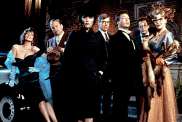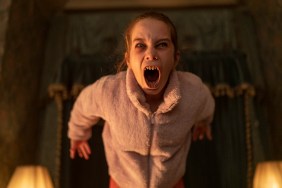
“Do you hate black people?” “Not all of them…” This is the beginning of a courtroom exchange that takes place late in Mike Binder‘s Black or White and it absolutely, without a doubt, makes for the best couple of minutes in what is an otherwise unoriginal race drama involving a white grandfather fighting for custody of his half-black granddaughter. It’s a scene that has something to say in a very honest, upfront way and it makes me wonder why Binder felt it was necessary to beat the audience over the head with stereotypes over the course of the rest of the film.
Is it a lack of confidence? A fear of telling a racially charged story and not wanting to appear insensitive? What is it? Tackling racial issues is no easy feat, but sugar-coating things so it’s easier to confront tough topics doesn’t make it any better. Beyond racial themes, Black or White also hits the subject of alcoholism with a sledgehammer and perhaps I’m being unfair as a result of years of seeing the same issues brought up in a similarly half-hearted manner, but it’s my reaction nevertheless.
Elliot Anderson (Kevin Costner) is a successful lawyer whose just lost his wife in a car accident. At home is his wise-beyond-her-years granddaughter, Eloise, played by the very cute Jillian Estell. Eloise has been raised by her grandparents ever since her mother died during childbirth and her crack-addicted father, Reggie (André Holland), split. She’s still in touch with her other grandmother, Rowena (Octavia Spencer), and once Elliot’s wife passes away it’s Rowena that suggests it might be time for Eloise to come live with her and then ultimately Reggie, as he shows up out of nowhere, making Elliot’s custody fight that much more difficult.
Why would it be better for Eloise to live with Rowena and her deadbeat father? Well, if you have to ask you must not have read the title close enough. There isn’t a single moment in this film that isn’t telegraphed in advance, other than the one scene I mentioned at the opening.
As the lawyers begin strategizing on how best to tackle the case, Elliot finds his lawyer (Bill Burr) wanting to focus on Reggie’s criminal record and history of drug abuse. On the other side of the fence is Anthony Mackie as Jeremiah Jeffers, who will seek to target Elliot as a racist drunk that dislikes black people. The problem is, Binder has written all of these characters as much deeper than this dividing line of black against white.
Elliot, flawed as he may be, isn’t racist and neither is Rowena. Hell, even Reggie has depth to his character, but Binder plays each of them to stereotypes for the majority of the film, leaving little to nothing for them to work with. The actors can hardly even act or create nuanced characters as they are forced to read lines and play up these stereotypes.
Admittedly, the film isn’t entirely limited to just the one scene I’ve already mentioned. Mackie’s character has a great, rage-filled moment, chastising Reggie for his behavior and how it’s people such as himself that act and behave the way he does that causes the entire race to be unfairly pigeonholed by closed minded individuals. These are great topics to be discussed and perhaps by presenting them in a relatively safe narrative the conversation will spread a little wider, but it doesn’t necessarily make for a compelling feature.
Costner gives a satisfactory performance, but I couldn’t help but shrug every time Elliot pours himself another glass of liquor. I understand alcoholics are constantly drinking, but I find it to be the least thematically interesting disease you can put in a movie. Here is a grandfather fighting to retain custody of his granddaughter and he chooses to get smashed every moment he has? Sorry, if you’re looking for my sympathy you’re not going to get it and I’m tired of watching movies with the shouts of “Don’t take another drink!” running through my head.
The best performances, however, come from two supporting characters. First there’s Mpho Koaho as the tutor Elliot hires for Eloise and as much as he may be used for comedy relief, Koaho is personable and welcoming. Also, as weird as it feels praising her performance in a rather standard role, I really enjoyed Paula Newsome as the judge. I don’t know what it was, but her demeanor behind the bench just worked for me.
Overall, Black or White has a couple of great moments that are otherwise marred by stereotypical storytelling tropes that cause the film to languish in mediocrity. I can’t say I expected all that much, despite being a fan of Binder’s last film, Reign Over Me, and hopefully the next time he takes seven years to make a movie the end result will be a little more nuanced than this one.









